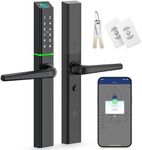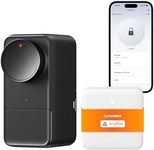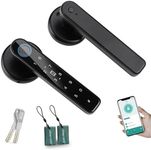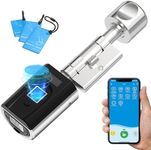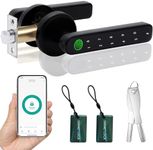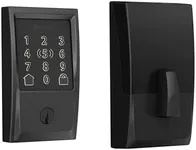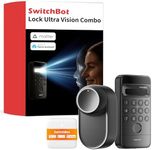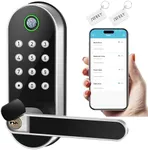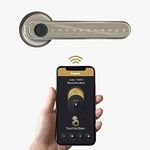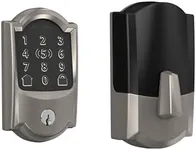Buying Guide for the Best Smart Lock For Airbnb
Choosing the right smart lock for your Airbnb property is crucial for ensuring the security and convenience of both you and your guests. A smart lock allows you to manage access remotely, eliminating the need for physical keys and providing a seamless check-in experience. When selecting a smart lock, consider factors such as ease of use, security features, compatibility with your existing systems, and the ability to manage multiple users. Understanding the key specifications will help you make an informed decision that suits your specific needs.ConnectivityConnectivity refers to how the smart lock communicates with your devices or network. Common options include Bluetooth, Wi-Fi, and Z-Wave. Bluetooth is great for local control, while Wi-Fi allows remote access and control from anywhere. Z-Wave is often used in smart home systems for reliable communication. If you need to manage the lock remotely, Wi-Fi is essential. For local control without internet dependency, Bluetooth is sufficient. Consider your property's internet setup and how you plan to manage access when choosing the connectivity type.
Access MethodsAccess methods are the ways guests can unlock the door. Options include keypad entry, mobile app, fingerprint, and traditional key. Keypad entry is popular for Airbnb as it allows guests to enter a code without needing a physical key. Mobile app access provides convenience and remote management. Fingerprint access offers high security but may not be ideal for all guests. Consider the ease of use for guests and your ability to manage codes or app access when selecting access methods.
Security FeaturesSecurity features ensure the lock is safe from tampering and unauthorized access. Look for features like encryption, tamper alerts, and auto-locking. Encryption protects data exchanged between the lock and your devices. Tamper alerts notify you of any attempts to break in. Auto-locking ensures the door locks automatically after a set period. If security is a top priority, focus on locks with robust encryption and alert systems. Consider the level of security needed based on your property's location and guest turnover.
Integration with Smart Home SystemsIntegration with smart home systems allows the lock to work with other devices like security cameras or thermostats. Compatibility with platforms like Amazon Alexa, Google Assistant, or Apple HomeKit can enhance convenience and automation. If you have a smart home setup, choose a lock that integrates seamlessly with your existing devices. Consider how you want to automate tasks, such as locking the door when the security system is armed, to determine the level of integration needed.
Battery LifeBattery life indicates how long the lock can operate before needing a battery replacement. Longer battery life means less frequent maintenance. Smart locks typically use AA batteries or rechargeable options. Look for locks with battery life indicators or low-battery alerts to avoid unexpected lockouts. If your property has high guest turnover, opt for a lock with longer battery life to minimize disruptions. Consider how often you can check and replace batteries when choosing a lock.
InstallationInstallation refers to how easy it is to set up the smart lock on your door. Some locks require professional installation, while others are DIY-friendly. Consider the type of door and existing lock setup when choosing a smart lock. If you're not handy, opt for a lock with straightforward installation instructions or seek professional help. Evaluate the time and effort you're willing to invest in installation to ensure a smooth setup process.


